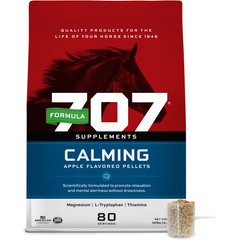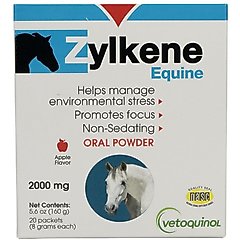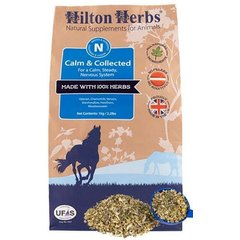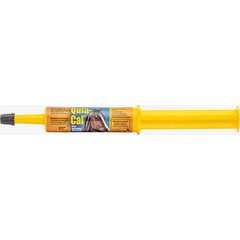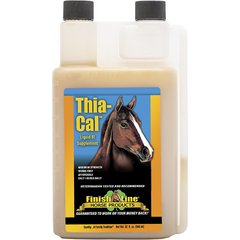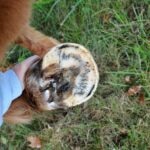How To Choose The Best Calming Supplements for Horses That Actually Work
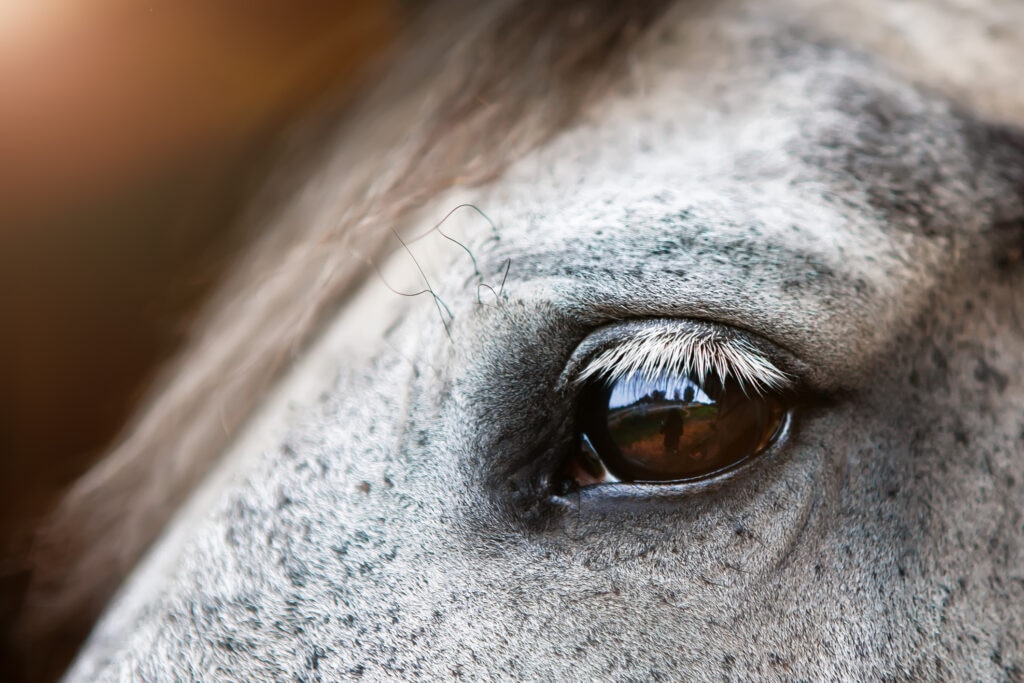
Photo by Natallia Saksonova/iStock/Getty Images Plus
Horses evolved to roam freely in herds and spend much of their time grazing. In our modern world, we often ask them to ride in enclosed trailers, live in stalls, eat at specific mealtimes, and carry us on their backs. So it’s hardly surprising that many domestic horses show signs of stress and anxiety.
That’s why many equestrians are turning to calming supplements for horses. But do calming supplements work? And if so, which ingredients are most effective?
To get the scoop on calming supplements, we spoke to Katherine Houpt, VMD, PhD, professor emeritus of behavior medicine at Cornell University in Ithaca, New York; and Natalie Lord, DVM, a large and small animal veterinarian at Four Paws – Cuatro Patas in Austin, Texas.
Key Takeaways
- Studies show that alpha-casozepine supplements may help calm horses during stressful experiences.
- Other common calming supplement ingredients, like magnesium and B vitamins, have less scientific backing in horses, but they may help to support healthy nerve function.
- Many equestrian sports organizations prohibit the use of calming supplements during competitions.
- For particularly stressful life events, like recovering from surgery, prescription sedatives may be a better choice than supplements.
What Are Calming Supplements for Horses?
Calming supplements for horses are dietary additives intended to help reduce stress and anxiety in horses while promoting docile, cooperative behavior.
Key Ingredients in Horse Calming Supplements
- Magnesium: Supports nervous system and muscle function, and inhibits neurotransmitters associated with anxiety
- Alpha-casozepine: Stimulates calming neurotransmitters and soothes the body by interacting with the brain’s opioid system, without sedative effects
- Tryptophan: A precursor to serotonin, meaning the body turns it into serotonin
- Thiamine (vitamin B1): Supports nervous system stability and muscle contraction; thiamine deficiencies in humans can lead to severe neurological effects
- Herbal extracts: May include valerian, chamomile, ashwagandha, lemon balm; all have some known anti-anxiety effects in humans, but studies in horses are limited.
- Amino acids and minerals: A deficiency in minerals like calcium and zinc, or amino acids like taurine, has been associated with low mood in humans, while calcium supplementation may help reduce anxiety in some people
Supplements can be purchased without a veterinarian’s prescription. Still, it’s wise to speak with your veterinarian before starting your horse on any new supplement, since the products are not regulated by the Food and Drug Administration.
Common Causes of Equine Anxiety
Horses may experience anxiety in any situation they find stressful. A few of the most common stressors for horses include:
- Trailer loading and travel
- Separation from herdmates
- Horse shows and competitions, especially in unfamiliar environments
- Transitioning to a new home
- Entering training for the first time
- Pressure to learn new behaviors or perform at a high level
- An abrupt increase or decrease in workload
- Conflict with other horses
- Confinement, such as stall rest
- Predator encounters
- Changes to an established routine
- Overstimulating environments, e.g., parades, rodeos
- Short-term exposure to frightening stimuli, e.g., fireworks displays
- Excessive artificial light in the environment
- Nutritional deficiencies or imbalances
- Loneliness
- Boredom
- Physical pain
Stress is a normal, inevitable part of life for horses, just like it is for humans. In fact, mild to moderate stress may actually enhance learning in horses.
Severe stress exposure, however, can block learning and lead to difficult or even dangerous equine behaviors. Always make sure to monitor your horse’s body language.
Types of Equine Calming Supplements
A wide variety of calming supplements for horses are available. As Dr. Houpt recounts, “I once visited a stable where every single horse was getting a calming supplement.” With so many different formulations, even the pickiest horse can find a palatable calming supplement.
Some popular calming supplement types include:
- Pelleted feeds like Formula 707 Calming, which combines magnesium, thiamine, and L-tryptophan in an apple-flavored formula most horses enjoy
Recommended Product
- Oral powders like Zylkene, which is a newer formula containing a milk protein that has been shown in controlled studies to help reduce stress and improve learning retention in horses
Recommended Product
- Loose herb blends like Hilton Herbs which contain valerian, chamomile, vervain, marshmallow, hawthorn, and meadowsweet
Recommended Product
- Oral pastes like Finish Line, which delivers magnesium, thiamine, and calcium in a single syringe intended for use immediately before a potentially stressful event
Recommended Product
- Liquids like Thia-Cal Liquid, which can be poured over any feed to add thiamine, magnesium, calcium, phosphorus, and salt
Recommended Product
Regardless of how they’re formulated, supplements aren’t sedatives. Calming supplements are intended to create a relaxing effect without sedation. Horses can be ridden or trained immediately after consuming a calming supplement. Some, like Zylkene, may even help improve the effects of training.
While calming supplements can work well for horses at home, many equestrian organizations have added calming supplements to their banned substances lists.
For instance, all supplements intended to help calm horses are prohibited in competitions governed by the Fédération Équestre Internationale (FEI), the International Federation for Equestrian Sports.
Check your sport’s rulebook carefully before competing with any horse taking a calming supplement.
How Horse Calming Supplements Work
Most ingredients in horse calming supplements have not been extensively studied in horses, Dr. Lord says, “There’s a lot of variability in individual horses’ responses, and not a lot of research. Usually, calming supplements contain high doses of B vitamins like thiamine to support the nervous system and skeletal muscle contraction.”
Supporting Neurotransmitter Balance
Neurotransmitters are chemicals that nerves use to share information with other parts of the body and stimulate certain reactions. For example, dopamine produces a sense of motivation, while epinephrine triggers fight-or-flight responses.
- Magnesium may inhibit glutamate, a neurotransmitter that can cause excessive nerve activity, leading to anxiety in humans. It also stimulates the release of another neurotransmitter, GABA (gamma-aminobutyric acid), which blunts feelings of anxiety.
- Alpha-casozepine seems to stimulate GABA release, and may be more effective at calming horses than magnesium.
- Thiamine is involved in both serotonin and GABA uptake, as well as the process of brain development and function.
- L-tryptophan is an important serotonin precursor—in other words, the body turns it into serotonin, a neurotransmitter that can affect mood and energy levels. It’s also believed to support the release of dopamine and norepinephrine, both of which are associated with focus, motivation, and rewards.
Keep in mind that we don’t know everything about how neurotransmitters work. And what we do know is constantly challenged.
Reducing Stress Hormone Response
Cortisol is a hormone produced by the adrenal glands in response to stress. Higher cortisol levels are typically associated with higher stress levels, while lower cortisol indicates lower stress levels.
Cortisol isn’t always a bad thing, it helps animals avoid danger, and supports memory formation so they can learn to avoid dangerous situations in the future. However, excessive cortisol can leave a person or animal feeling trapped in fight-or-flight mode.
In humans, tryptophan supplementation helps reduce cortisol response to social stressors, while magnesium helps reduce cortisol levels in people under chronic stress.
A 2017 study found that tryptophan supplementation reduced cortisol levels in horses undergoing a startle test. However, the horses’ behavior when startled did not change.
In a similar study conducted in 2023, a calming supplement that combined magnesium and citrus oils appeared to lower horses’ cortisol levels during a 15-minute trailer ride. In this case, supplementation also reduced horses’ response to a startle stimulus.
Nervous System Support and Muscle Relaxation
Magnesium helps to support nerve transmission and helps nerves communicate with muscles. Similarly, thiamine supports muscle conduction and contraction.
One 2017 study found that a calming paste with magnesium and thiamine reduced horses’ heart rates while they performed a stressful task.
Botanical and Herbal Actions
In humans, herbs like valerian, chamomile, and passionflower may help reduce anxiety, promote sleep, and improve mood. Research into the exact mechanisms by which this happens is ongoing. There are currently few studies on herbal calming supplements in horses, although one 2023 paper found that a valerian nasal spray reduced horses’ heart rates during the process of tacking up.
Those with show horses, beware: the U.S. Equestrian Federation (USEF) discourages competitors from using any herbal products or supplements. Some herbs, including valerian, are specifically prohibited, but all herbs have the potential to cause a positive drug test.
How To Choose the Best Calming Supplement for Horses
Effectiveness and Considerations
Keep in mind that nutritional supplements are most effective when used to treat a nutritional deficiency. Feeding more of a nutrient than your horse actually needs may not improve their behavior, and in some cases could lead to harmful effects.
For best results, discuss any new supplement with your veterinarian, and consider testing either your horse or their hay and forage to detect nutritional deficiencies and imbalances.
No calming supplement will be as effective as prescription medications like trazodone for calming horses, and calming supplements can’t override environmental causes of stress and anxiety.
The calming supplement most supported by scientific research in horses is Zylkene, which contains alpha-casozepine. However, it’s significantly more expensive than other options.
Supplementation with nutrients like magnesium, calcium, and thiamine is most effective in horses whose diet is deficient in those nutrients.
Every horse is a unique individual, so even in the same environment, different horses may respond to supplements differently. If calming supplements work for your horse, use them short-term to support a training and behavior modification program, then wean your horse off the supplement when their behavior has improved.
Safety and Regulations
Talk to your veterinarian before feeding any new supplement, and double-check your other supplements to make sure you aren’t giving your horse too much of the same nutrient.
If you compete in equestrian sports, check your sport’s rulebook and prohibited substances list carefully before choosing a supplement. Major sanctioning organizations, including U.S. Equestrian and FEI, have banned many or all common calming supplements.
Purchase supplements only from reputable brands that employ veterinarians and nutritionists.
Practical Tips for Using Calming Supplements
To choose the best calming supplement for your horse, follow these tips:
- Introduce new supplements one at a time, so you know what’s working and what isn’t.
- Try new supplements at home first, rather than at a show or during a stressful life event.
- Keep track of specific behavioral changes in writing.
- Measure supplements carefully, and don’t feed more than the manufacturer recommends.
- Use calming supplements to support the process of training your horse to handle stressful situations and new stimuli, rather than relying on supplements alone.
Mild to moderate stress can have positive long-term effects, so your goal shouldn’t be to give your horse a completely stress-free life. Instead, focus on protecting your horse from severe levels of stress, which can be harmful to physical and mental health.
If your horse remains dependent on calming supplements even after a concerted effort at training and desensitization, look for underlying causes of their stress. Your veterinarian can help rule out medical conditions and issues like sleep deprivation.
Calming supplements are increasingly common in equestrian facilities. Although research in horses is limited, the supplements’ active ingredients appear to have anti-anxiety effects in humans. Many horse owners say they see improvements in their horses’ behavior with calming supplements.
FAQs About Calming Horse Supplements
What is the best calming supplement for a horse?
Every horse is different, but Zylkene is backed by more research in horses than other calming supplements.
What herbs are calming for horses?
Herbs like valerian, lavender, chamomile, ashwagandha, and lemon balm may be included in horse calming supplements, but there’s not much research on their effectiveness in horses yet.
Do horse calming supplements have side effects?
Calming supplements purchased from a reputable manufacturer are unlikely to have harmful side effects at recommended doses. However, it’s important to check with your veterinarian when starting any new supplement.
